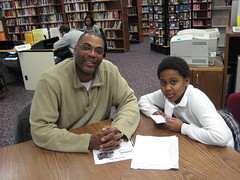As a musician and a software geek, let me tell you that mistakes must happen. The question isn't "am I going to make a mistake?" The question is "when I make my usual mistake, [how] will I recover gracefully?"
Image via Wikipedia
Thursday, June 25, 2009
On Mistakes
I am the love child of Daffy Duck and Goofy
First of all, if my life was made into a movie, I would spend the rest of my life attempting to destroy all extant copies of the movie. Too embarrassing.
 Image via Wikipedia
Image via Wikipedia
 Image via Wikipedia
Image via Wikipedia
Wednesday, June 24, 2009
Foot in Mouth disease: Everyone else's answer is much better than mine...
I am not a big fan of my nasty stinky mouth. I am that stereotypical nerd that blurts out sociopathic garbage. The only reason a few people still hang around me is that I take all criticism of myself seriously - I really try hard to give it a fair hearing, and if somebody has a beef with me, I am willing to meet them more than half-way to understand their viewpoint. Also, I much prefer open hostility to faked smarmy niceness - a fake smile really puts me on edge, and I can much better deal with somebody who openly hates me. Err, so I am just talking around the Plinky prompt... I am much better now that I am trying to build my self-esteem from an authentic place. Grouchiness can lead to "foot-in-mouth-disease" as well. Self-absorption leads to grouchiness.
 Image via Wikipedia
Image via Wikipedia
 Image via Wikipedia
Image via Wikipedia
Monday, June 22, 2009
Why "We Three Kings" make me cry? Never been beat up by Wise Man or Camel!
 Image via Wikipedia
Image via Wikipedia
This song is the only one that can make me cry. I have no idea why. I don't have any strong sad feelings about Christmas or Christmas music. Must be the melody. If I had some musical ability, I could state what it was unique about that melody.
There Is A Light That Never Goes Out by Smiths
I don't cry, but I do feel very melancholy. The first quarter century of my life was quite lonely - I had things to share, but I hadn't yet processed that I was on a unsustainable self-destructive path when it came to my relation to the outside world. There is nothing like *almost* hitting rock bottom to change self-destructive behaviors. I still have some unsustainable self-destructive behaviors, but I traded up to a better set of garbage behaviors, and I am self-aware and working on them daily.
 Image by Victor V via Flickr
Image by Victor V via Flickr
Brian Wilson by Barenaked Ladies
Again, no waterworks, but a feeling of melancholy. Again, a song about isolation. My isolation was profound during my collage years. I desperately wanted help. But my foolish pride kept me from examining my personal faults. I was playing an elaborate game to preserve my self-esteem, even though that self-esteem was fraudulent, and destructive. Bleh..
~~~~~~~~~~~~~~~~~~~~ ~~~~~~~~~~~~~~~~~~~~
 Brian Wilson via last.fm
Brian Wilson via last.fm
Thursday, June 18, 2009
Teeth falling out in my dreams
I cannot muster the effort to remember my dreams, but I can tell you some recurring themes and snippets:
 Image via Wikipedia
Image via Wikipedia
~~~~~~~~~~
~~~~~~~~~~
~~~~~~~~~~
 Image via Wikipedia
Image via Wikipedia
[Check out this cool high school plaque from Korea!] I have a lot of dreams where I have to control a car from the back seat (somehow working the steering wheel from back there, or quickly maneuvering into the drivers seat). Or driving, but instead of the normal view out the front windshield, for some strange reason I can see my own car, far ahead of myself, and I have to control it much like a remote control car, from a long distance, and with great difficulty.
My dreams feel a lot like my life: overcomplicated by my attempts to cope with my own run-away anxiety. I hate it. The situations are so complicated, I must admit they are quite interesting. Sometimes I look forward to sleep just so that I can ruminate over the peculiar situations I experienced in my dreams when I finally wake up.
 Image via Wikipedia
Image via Wikipedia
Wednesday, June 17, 2009
My sixth grade daughter is already smarter than I am... but here goes...
 Image via Wikipedia
Image via Wikipedia
One thing I suffered from as a kid was "learned helplessness". I just saw, too soon and too often, why my problems were completely hopeless. So when my daughter senses a problem, I try to just calmly talk her through some viewpoints where she, herself, can see the logical first steps to solving the problem. Does it help her? My wife and my daughter are strong women, so their complaining about a situation is usually an attempt at initial stress release, before they roll up their sleeves and dive in to solve the problem themselves. So I wouldn't be surprised if my daughter said I just run my mouth. She would not be the first to so accuse me.
Getting Along with PeopleThe social skill of meeting people, not half-way, but *MORE* than half-way. And getting a friend by *being* a friend. My daughter just points out how I don't seem to have too many friends. (Hmm, she has got a point there...)
Hard work counts more than smartsI had a little bit too easy a time when it came to schooling. A casual observer might mistake me for somebody with brains. But anyway you slice it, you can find a lot of failures that are long on brains and short on hard work. And if you think you have met a successful man who didn't have to work hard, just wait, the situation will soon reverse itself. My daughter points out that for somebody who claims to see the value of hard work, I do a pretty tiny amount of it. (Grr...) She has got the brains, and the hard work, already, so I am confident she will go far.
People with a sense of entitlement never go farI am not sure I have ever said this to my daughter. I repeat it to myself, over and over, but I don't think I have ever had reason to say it to her.
KISS: Keep It Simple, StupidUh, I have never said this to my daughter. My wife says it to me, repeatedly. My daughter has picked it up from my negative example. (Sigh...) I complicate everything I touch, to the point that simple tasks get so complicated I have to abandon them in despair. This Plinky prompt is getting more depressing...
Always be improving your morals and integrityI talk out loud to my daughter on this, about my own challenges, because I know that I have to actively work on improving my morals and integrity. I guess that is a pretty good way to express this, by honestly and openly working on this yourself, as a parent.
 Image by NJLA: New Jersey Library Association via Flickr
Image by NJLA: New Jersey Library Association via Flickr
I will stop here, because, at last, I have arrived at something where my daughter still has a way to go. Messy, messy writing. Her problem is that she can get good results just rushing and powering through the homework, but I hope she can learn to take time, because the care will pay off.
StratPlayer on "Self-Reliance"
Jess said:Years ago a singer song writer named Loudon Wainwright III wrote this lyric: My father thinks I’m no good for nothing I’ll never amount to much But he doesn’t know my secret weapon I can count on myself in the clutch
Loudon Wainwright III via last.fm
My first wife always looked for someone else to see her through the tough times. All of my children grew up with that ethic. They have been in trouble all their lives.
Image via Wikipedia
There's a song by The Hives where they say "You get what's given to you", and it's about the kind of people who blame everyone else for their problems and have this sense of entitlement they present to the world. My mother is like that. I hope it didn't spread.My comment:
 Image by L Lemos via Flickr
Image by L Lemos via Flickr
Tuesday, June 16, 2009
Tod Browning's "Freaks"
 Image via Wikipedia
Image via Wikipedia
This isn’t a goodie, it’s a diatribe a harangue on mans inhumanity to man. It is as inhumane as any genocide or nuclear device. All the same well done.My comment: I'm not 100% in agreement. I hear what you are saying about cruelty, but there are two sides to the coin. Some carnival freaks appreciated their lifestyle. In the modern politically correct world, people with profound physical disfigurements are now supposed to stoically and noiselessly blend into the walls - is it dignity or is it facilitating being ignored?.
 Image via Wikipedia
Image via Wikipedia
Monday, June 15, 2009
Dive Into Python 3 - httplib2
 Image via Wikipedia
Image via Wikipedia
 Image via Wikipedia
Image via Wikipedia
 Image via Wikipedia
Image via Wikipedia
Run a lingerie shop while blushing, stammering, hiding from wife
 LINGERIE 2009 085
LINGERIE 2009 085 Having a store is difficult, in any economy, because of the fixed expenses, especially rent. That is why the Apple store is so impressive. I admire Steve Jobs for pulling it off. Took my daughter there to buy a colorful case for her iPod Touch, and the store was packed, and people seemed happy and employees where easy to find. I searched around for a extended battery for her iPod, and she planted herself in front of a workstation running a kid's game. Very well run store. The other stores we visited at the mall just didn't seem to have the same amount of product being moved. It is all about Gettin' Paid, Baby!
If I had a store, it would have to be a labor of love, where even if I wasn't moving tons of product, the store would be full of enthusiasts, which is nice. Maybe a knife and cutlery store, where I also do reasonably priced sharpening, while patrons wait. The mechanics of a properly sharpened knife or cutting tool are interesting, and sharp knifes are less dangerous than dull knives, because a dull blade leads to excessive force to cut leads to the knife slipping and stabbing leads to somebody getting really hurt. People instinctively treat a well sharpened knife carefully, as well. Maybe a very large selection of protective covers for all kinds of cutlery, so people could walk in with their nice cutlery, get it sharpened while they wait, and leave with a snug fitting protective cover, so their knives stay sharp and safe in the drawer. And they would also walk out with new cooking utensils, because they browse while they wait.
 Image by cobalt123 via Flickr
Image by cobalt123 via FlickrMy wife always talks about opening a restaurant. She is a very fine cook, of many different types of food, of many different types of cuisine, and instinctively knows how to cook efficiently so that the courses of food get in front of the patrons at the right time. But if any customer complains, she will cleave their head open with a butcher's knife. (My baby is a little sensitive to criticism.) Probably best to serve from a open window on the side of a building, so people take their yummy food and split, or otherwise focus on take-out. Reduce the chances of homicide of complaining customers.
Friday, June 12, 2009
Jp Calderone knows how to override __eq__. Do you?
 Image via Wikipedia
Image via Wikipedia
class A(object):
def __init__(self, foo):
self.foo = foo
def __eq__(self, other):
if isinstance(other, A):
return self.foo == other.foo
return NotImplemented
def __ne__(self, other):
result = self.__eq__(other)
if result is NotImplemented:
return result
return not result
If you want an immutable object that can be used as a dictionary key, you will want to implement "__hash__", along with "__eq__" and "__ne__".
If you are implementing inequality comparisons - Be Careful - supply the full complement of inequality comparisons and take care when using "NotImplemented". The default implementations of "less-than __lt__" "less-than-or-equals __le__" "greater-than __gt__" "greater-than-or-equals __ge__" aren’t very useful - they compare by address using id(). This default inequality comparison can introduce intermittent bugs in your comparison code. If there is no meaningful comparison between different types or classes, raise a TypeError, so there is no risk of falling back on the terrible default inequality comparison implementation. This problem will be fixed in Python3.
The fastest and most complete solution is this code from Raymond Hettinger - Python Cookbook recipe 576685: Total ordering class decorator.
def total_ordering(cls):
'Class decorator that fills-in missing ordering methods'
convert = {
'__lt__': [('__gt__', lambda self, other: other < self),
('__le__', lambda self, other: not other < self),
('__ge__', lambda self, other: not self < other)],
'__le__': [('__ge__', lambda self, other: other <= self),
('__lt__', lambda self, other: not other <= self),
('__gt__', lambda self, other: not self <= other)],
'__gt__': [('__lt__', lambda self, other: other > self),
('__ge__', lambda self, other: not other > self),
('__le__', lambda self, other: not self > other)],
'__ge__': [('__le__', lambda self, other: other >= self),
('__gt__', lambda self, other: not other >= self),
('__lt__', lambda self, other: not self >= other)]
}
roots = set(dir(cls)) & set(convert)
assert roots, 'must define at least one ordering operation: < > <= >='
root = max(roots) # prefer __lt __ to __le__ to __gt__ to __ge__
for opname, opfunc in convert[root]:
if opname not in roots:
opfunc.__name__ = opname
opfunc.__doc__ = getattr(int, opname).__doc__
setattr(cls, opname, opfunc)
return cls
For a lower tech solution, consider using this Mixin class for inequality comparison special methods [from Fuzzyman: http://www.voidspace.org.uk/python/articles/comparison.shtml]
class RichComparisonMixin(object):
def __eq__(self, other):
raise NotImplementedError("Equality not implemented")
def __lt__(self, other):
raise NotImplementedError("Less than not implemented")
def __ne__(self, other):
return not self.__eq__(other)
def __gt__(self, other):
return not (self.__lt__(other) or self.__eq__(other))
def __le__(self, other):
return self.__eq__(other) or self.__lt__(other)
def __ge__(self, other):
return not self.__lt__(other)
 Image via Wikipedia
Image via Wikipedia
 Image by Michael Foord via Flickr
Image by Michael Foord via Flickr
Wednesday, June 10, 2009
[Public Service Message] Jury Nullification: Please inform yourself about this fundamental right
[Public Service Message] Jury Nullification: Please inform yourself about this fundamental right
First a public service message... Please inform yourself of the right of Jury Nullification. This is a fundamental right you posses as a juror, that doesn't get a lot said about it. If the law is unjust, you have the right to acquit - to say "Not Guilty" - even in the face of the defendant's violation of the letter of the law.
 Image via Wikipedia
Image via Wikipedia
Image via Wikipedia
The book I would take if I had jury duty today would be Judea Pearl's _Causality: Models, Reasoning, and Inference_, because I have to review the book again (and review the notes I wrote in the margins in my own copy). It is a very difficult book - I was only able to read about six pages a day. The book is about Causality -- effect following cause. We take the concept for granted, but it has been on shaky ground since David Hume in the 18th century. But now, because of researchers like Judea Pearl, it is on solid footing. Here is the 5 minute summary: Write down all the possible causes and effects on a piece of paper - we will call these "points". Draw arrows from things you think are direct causes to the things you think are direct effects. Now you will have a bunch of "points" and "arrows" between those points. Look for loops - search for any "loops" that can be made by tracing your finger from point to point, always tracing your finger from arrow tail to arrow head. Are there zero loops? If so - good! - you have a description of causality, and you can use this diagram to understand the casual effects and interactions. Now, how can you tell if your diagram is, in fact, representative of the real world? Well, on the points of the graph, there is a "DO operation" linked with a manipulation you can do in the real world. Manipulations can be like fixing different variables in a scientific experiment, or like making a careful experiment that isolates the object of interest from anything that might mess things up. Consider these points: (A) Lawn Sprinkler near sidewalk; (B) Rain cloud over sidewalk; (C) wetness of sidewalk; (D) slipperiness of sidewalk; (E) number of people falling on slippery sidewalk Consider these arrows: (A -> C); (B -> C); (C -> D -> E) Draw it, run finger over graph, cannot find any loops - good! - ready to begin. We will try the DO operation on (C). On the graph, I just set "wetness" to "very wet" or "very dry" or whatever, and make a prediction. In the real world, I can either water down the sidewalk with a garden hose, or shield the sidewalk from the sprinklers with a tarp and shield from rain with a canopy and dry the sidewalk with a towel then a hairdryer. If the predictions match between the graph and number of people falling on the slippery sidewalk, I feel good that I have a graph representative of the real world. (This is a dumb example, because humans can handle the casual analysis of this situation with no problem. It only gets interesting as the graph gets more complicated.) Check the book out of your nearest university library (there is a 2nd edition coming out soon, but I wouldn't worry about it - no major revisions). Read only the last chapter, which is the text and slides from an informal lecture Judea Pearl gave. It is enough. The rest of the book is very difficult, or at least it was for me. I will probably have to read it two or three more times, on top of already reading it once carefully, to fully understand everything developed. My copy is heavily marked up, and I think I made a lot of mistakes, because I needed to think through it all more. So you probably don't want to borrow my marked up copy (not that I would actually lend it to you - the guy who lends out my books is sick today :P )
![Reblog this post [with Zemanta]](http://img.zemanta.com/reblog_e.png?x-id=feca7c42-de05-40df-ac3f-7da1ad476306)
![Reblog this post [with Zemanta]](http://img.zemanta.com/reblog_e.png?x-id=1c2dbf78-1890-49d7-b8dd-44e22a6ca609)
![Reblog this post [with Zemanta]](http://img.zemanta.com/reblog_e.png?x-id=6c43ef87-c368-46c8-bf54-92ac8fd7e062)



![Reblog this post [with Zemanta]](http://img.zemanta.com/reblog_e.png?x-id=06434817-1366-4945-8907-fded380d0277)
![Reblog this post [with Zemanta]](http://img.zemanta.com/reblog_e.png?x-id=e7ac5e34-2efc-4cf6-9f84-e90ecc999131)
![Reblog this post [with Zemanta]](http://img.zemanta.com/reblog_e.png?x-id=00cf62d1-5668-40d2-9d98-a2b957ff6460)
![Reblog this post [with Zemanta]](http://img.zemanta.com/reblog_e.png?x-id=e49e62fa-eb32-4993-a58e-7d6299d04605)
![Reblog this post [with Zemanta]](http://img.zemanta.com/reblog_e.png?x-id=500e3af4-a866-4daf-820a-d663944e9b8d)
![Reblog this post [with Zemanta]](http://img.zemanta.com/reblog_e.png?x-id=a2ae2ff0-4041-44f8-81a3-dbddcbe9c01e)

![Reblog this post [with Zemanta]](http://img.zemanta.com/reblog_e.png?x-id=86b19a7c-bd7e-475f-9b3b-0503b50da8bf)

![Reblog this post [with Zemanta]](http://img.zemanta.com/reblog_e.png?x-id=ed1ab458-b039-4c1c-abee-528402e1d414)